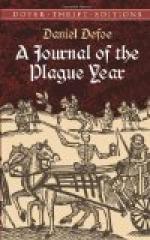I got admittance into the churchyard by being acquainted with the sexton who attended, who, though he did not refuse me at all, yet earnestly persuaded me not to go, telling me very seriously (for he was a good, religious, and sensible man) that it was indeed their business and duty to venture, and to run all hazards, and that in it they might hope to be preserved; but that I had no apparent call to it but my own curiosity, which, he said, he believed I would not pretend was sufficient to justify my running that hazard. I told him I had been pressed in my mind to go, and that perhaps it might be an instructing sight that might not be without its uses. “Nay,” says the good man, “if you will venture upon that score, ’name of God,[111] go in; for, depend upon it, it will be a sermon to you, it may be, the best that ever you heard in your life. It is a speaking sight,” says he, “and has a voice with it, and a loud one, to call us all to repentance;” and with that he opened the door, and said, “Go, if you will.”
His discourse had shocked my resolution a little, and I stood wavering for a good while; but just at that interval I saw two links[112] come over from the end of the Minories, and heard the bellman, and then appeared a “dead cart,” as they called it, coming over the streets: so I could no longer resist my desire of seeing it, and went in. There was nobody, as I could perceive at first, in the churchyard, or going into it, but the buriers, and the fellow that drove the cart, or rather led the horse and cart; but when they came up to the pit, they saw a man go to and again,[113] muffled up in a brown cloak, and making motions with his hands, under his cloak, as if he was[114] in great agony. And the buriers immediately gathered about him, supposing he was one of those poor delirious or desperate creatures that used to pretend, as I have said, to bury themselves. He said nothing as he walked about, but two or three times groaned very deeply and loud, and sighed as[115] he would break his heart.
When the buriers came up to him, they soon found he was neither a person infected and desperate, as I have observed above, or a person distempered in mind, but one oppressed with a dreadful weight of grief indeed, having his wife and several of his children all in the cart that was just come in with him; and he followed in an agony and excess of sorrow. He mourned heartily, as it was easy to see, but with a kind of masculine grief, that could not give itself vent by tears, and, calmly desiring the buriers to let him alone, said he would only see the bodies thrown in, and go away. So they left importuning him; but no sooner was the cart turned round, and the bodies shot into the pit promiscuously,—which was a surprise to him, for he at least expected they would have been decently laid in, though, indeed, he was afterwards convinced that was impracticable,—I say, no sooner did he see the sight, but he cried out aloud, unable to contain himself. I could




